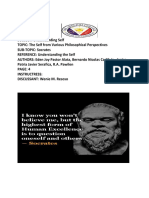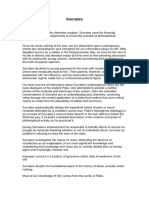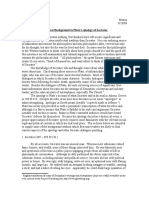Socrates
Socrates
Uploaded by
Joshua DownsCopyright:
Available Formats
Socrates
Socrates
Uploaded by
Joshua DownsCopyright
Available Formats
Share this document
Did you find this document useful?
Is this content inappropriate?
Copyright:
Available Formats
Socrates
Socrates
Uploaded by
Joshua DownsCopyright:
Available Formats
What where Socrates political views and how did he express them?
It is often argued that Socrates believed "ideals belong in a world only the wise man can understand",[citation needed] making the philosopher the only type of person suitable to govern others. In Plato's dialogue the Republic, Socrates was in no way subtle about his particular beliefs on government. He openly objected to the democracy that ran Athens during his adult life. It was not only Athenian democracy: Socrates objected to any form of government that did not conform to his ideal of a perfect republic led by philosophers, and Athenian government was far from that. It is, however, possible that the Socrates of Plato's Republic is colored by Plato's own views. During the last years of Socrates' life, Athens was in continual flux due to political upheaval. Democracy was at last overthrown by a junta known as the Thirty Tyrants, led by Plato's relative, Critias, who had been a student of Socrates. The Tyrants ruled for about a year before the Athenian democracy was reinstated, at which point it declared an amnesty for all recent events. Socrates' opposition to democracy is often denied, and the question is one of the biggest philosophical debates when trying to determine exactly what Socrates believed. The strongest argument of those who claim Socrates did not actually believe in the idea of philosopher kings is that the view is expressed no earlier than Plato's Republic, which is widely considered one of Plato's "Middle" dialogues and not representative of the historical Socrates' views. Furthermore, according to Plato's Apology of Socrates, an "early" dialogue, Socrates refused to pursue conventional politics; he often stated he could not look into other's matters or tell people how to live their lives when he did not yet understand how to live his own. He believed he was a philosopher engaged in the pursuit of Truth, and did not claim to know it fully. Socrates' acceptance of his death sentence, after his conviction by the Boule (Senate), can also be seen to support this view. It is often claimed much of the anti-democratic leanings are from Plato, who was never able to overcome his disgust at what was done to his teacher. In any case, it is clear Socrates thought the rule of the Thirty Tyrants was at least as objectionable as democracy; when called before them to assist in the arrest of a fellow Athenian, Socrates refused and narrowly escaped death before the Tyrants were overthrown. He did however fulfill his duty to serve as prytanis when a trial of a group of generals who presided over a disastrous naval campaign were judged; even then he maintained an uncompromising attitude, being one of those who refused to proceed in a manner not supported by the laws, despite intense pressure. Judging by his actions, he considered the rule of the Thirty Tyrants less legitimate than the democratic senate that sentenced him to death. Politics It is argued that Socrates believed "ideals belong in a world only the wise man can understand",[38] making the philosopher the only type of person suitable to govern others. In Plato's dialogue the Republic, Socrates openly objected to the democracy that ran Athens during his adult life. It was not only Athenian democracy: Socrates found short of ideal any government that did not conform to his presentation of a perfect regime led by philosophers, and Athenian government was far from that. It is, however, possible that the Socrates of Plato's Republic is colored by Plato's own views. During the last years of Socrates' life, Athens was in continual flux due to political upheaval. Democracy was at last overthrown by a junta known as the Thirty Tyrants, led by Plato's relative, Critias, who had been a friend of Socrates. The Tyrants ruled for about a year before the Athenian democracy was reinstated, at which point it declared an amnesty for all recent events. Socrates' opposition to democracy is often denied, and the question is one of the biggest philosophical debates when trying to determine exactly what Socrates believed. The strongest argument of those who claim Socrates did not actually believe in the idea of philosopher kings is that the view is expressed no earlier than Plato's Republic, which is widely considered one of Plato's "Middle" dialogues and not representative of the historical Socrates' views. Furthermore, according to Plato's Apology of Socrates, an
"early" dialogue, Socrates refused to pursue conventional politics; he often stated he could not look into other's matters or tell people how to live their lives when he did not yet understand how to live his own. He believed he was a philosopher engaged in the pursuit of Truth, and did not claim to know it fully. Socrates' acceptance of his death sentence after his conviction can also be seen to support this view. It is often claimed much of the anti-democratic leanings are from Plato, who was never able to overcome his disgust at what was done to his teacher. In any case, it is clear Socrates thought the rule of the Thirty Tyrants was also objectionable; when called before them to assist in the arrest of a fellow Athenian, Socrates refused and narrowly escaped death before the Tyrants were overthrown. He did, however, fulfill his duty to serve as Prytanis when a trial of a group of Generals who presided over a disastrous naval campaign were judged; even then he maintained an uncompromising attitude, being one of those who refused to proceed in a manner not supported by the laws, despite intense pressure.[39] Judging by his actions, he considered the rule of the Thirty Tyrants less legitimate than the Democratic Senate that sentenced him to death. Socrates' apparent respect for democracy is one of the themes emphasized in the 2008 play Socrates on Trial by Andrew Irvine. Irvine argues that it was because of his loyalty to Athenian democracy that Socrates was willing to accept the verdict of his fellow citizens. As Irvine puts it, During a time of war and great social and intellectual upheaval, Socrates felt compelled to express his views openly, regardless of the consequences. As a result, he is remembered today, not only for his sharp wit and high ethical standards, but also for his loyalty to the view that in a democracy the best way for a man to serve himself, his friends, and his city even during times of war is by being loyal to, and by speaking publicly about, the truth.[40] Philosophy Socratic method Main article: Socratic method Perhaps his most important contribution to Western thought is his dialectic method of inquiry, known as the Socratic method or method of "elenchus", which he largely applied to the examination of key moral concepts such as the Good and Justice. It was first described by Plato in theSocratic Dialogues. To solve a problem, it would be broken down into a series of questions, the answers to which gradually distill the answer a person would seek. The influence of this approach is most strongly felt today in the use of the scientific method, in which hypothesis is the first stage. The development and practice of this method is one of Socrates' most enduring contributions, and is a key factor in earning his mantle as the father ofpolitical philosophy, ethics or moral philosophy, and as a figurehead of all the central themes in Western philosophy. To illustrate the use of the Socratic method; a series of questions are posed to help a person or group to determine their underlying beliefs and the extent of their knowledge. The Socratic method is a negative method of hypothesis elimination, in that better hypotheses are found by steadily identifying and eliminating those that lead to contradictions. It was designed to force one to examine one's own beliefs and the validity of such beliefs. An alternative interpretation of the dialectic is that it is a method for direct perception of the Form of the Good. Philosopher Karl Popper describes the dialectic as "the art of intellectual intuition, of visualising the divine originals, the Forms or Ideas, of unveiling the Great Mystery behind the common man's
everyday world of appearances."[28] In a similar vein, French philosopher Pierre Hadot suggests that the dialogues are a type of spiritual exercise. "Furthermore," writes Hadot, "in Plato's view, every dialectical exercise, precisely because it is an exercise of pure thought, subject to the demands of the Logos, turns the soul away from the sensible world, and allows it to convert itself towards the Good."[29] Philosophical beliefs The beliefs of Socrates, as distinct from those of Plato, are difficult to discern. Little in the way of concrete evidence exists to demarcate the two. The lengthy presentation of ideas given in most of the dialogues may be deformed by Plato, and some scholars think Plato so adapted the Socratic style as to make the literary character and the philosopher himself impossible to distinguish. Others argue that he did have his own theories and beliefs, but there is much controversy over what these might have been, owing to the difficulty of separating Socrates from Plato and the difficulty of interpreting even the dramatic writings concerning Socrates. Consequently, distinguishing the philosophical beliefs of Socrates from those of Plato and Xenophon is not easy and it must be remembered that what is attributed to Socrates might more closely reflect the specific concerns of these thinkers. The matter is complicated because the historical Socrates seems to have been notorious for asking questions but not answering, claiming to lack wisdom concerning the subjects about which he questioned others.[30] If anything in general can be said about the philosophical beliefs of Socrates, it is that he was morally, intellectually, and politically at odds with many of his fellow Athenians. When he is on trial for heresy and corrupting the minds of the youth of Athens, he uses his method of elenchos to demonstrate to the jurors that their moral values are wrong-headed. He tells them they are concerned with their families, careers, and political responsibilities when they ought to be worried about the "welfare of their souls". Socrates' assertion that the gods had singled him out as a divine emissary seemed to provoke irritation, if not outright ridicule. Socrates also questioned the Sophistic doctrine that arete (virtue) can be taught. He liked to observe that successful fathers (such as the prominent military general Pericles) did not produce sons of their own quality. Socrates argued that moral excellence was more a matter of divine bequest than parental nurture. This belief may have contributed to his lack of anxiety about the future of his own sons. Also: There should be no doubt that, despite his claim to know only that he knew nothing, Socrates had strong beliefs about the divine. According to Xenophon, he was a teleologist who held that god arranges everything for the best.[31] Socrates frequently says his ideas are not his own, but his teachers'. He mentions several influences: Prodicus the rhetor and Anaxagoras the philosopher. Perhaps surprisingly, Socrates claims to have been deeply influenced by two women besides his mother: he says that Diotima, a witch and priestess from Mantinea, taught him all he knows about eros, or love; and that Aspasia, the mistress of Pericles, taught him the art of rhetoric.[32] John Burnet argued that his principal teacher was the Anaxagorean Archelaus but his ideas were as Plato described them; Eric A. Havelock, on the other hand, considered Socrates' association with the Anaxagoreans to be evidence of Plato's philosophical separation from Socrates.
You might also like
- After Democracy Imagining Our Political Future Zizi PapacharissiDocument149 pagesAfter Democracy Imagining Our Political Future Zizi PapacharissiBrandon RojasNo ratings yet
- Bio OF SocratesDocument2 pagesBio OF SocratesGdisipuloNo ratings yet
- Western Dialectic Justice: SocratesDocument3 pagesWestern Dialectic Justice: SocratesTeona TurashviliNo ratings yet
- Contribution of Plato in Political ThoughtDocument18 pagesContribution of Plato in Political ThoughtKOTUB UDDIN AHMED100% (2)
- Name of The Philosopher: Socrates Origin:: Classical Greek Athenian PhilosopherDocument6 pagesName of The Philosopher: Socrates Origin:: Classical Greek Athenian PhilosopherPonnusamy ManivelNo ratings yet
- Socrates Story of LifeDocument8 pagesSocrates Story of LifeShane Loryll RosalejosNo ratings yet
- CPP Unit 2 Plato BiographyDocument17 pagesCPP Unit 2 Plato BiographyARDRA MuralikrishnanNo ratings yet
- PlatoDocument27 pagesPlatoTalha GondalNo ratings yet
- Unit 2 PlatoDocument16 pagesUnit 2 Platoshekar6886No ratings yet
- Written Report Grp1 Socsci Final. CNDocument9 pagesWritten Report Grp1 Socsci Final. CNJc LoremiaNo ratings yet
- ReportingDocument3 pagesReportingJake Cormanes PeraltaNo ratings yet
- Philosophy and The Examined LifeDocument3 pagesPhilosophy and The Examined LifeCtorres910No ratings yet
- PhilosophyDocument2 pagesPhilosophyMayar YasserNo ratings yet
- Plato: Importance of Plato's Political PhilosophyDocument18 pagesPlato: Importance of Plato's Political PhilosophySomoyeta DuttaNo ratings yet
- Analysisi of Apology of SocratesDocument4 pagesAnalysisi of Apology of SocratesAyoub yopiNo ratings yet
- Socrates The Father of Western Philosophy - EnglishDocument4 pagesSocrates The Father of Western Philosophy - EnglishKarolina PtNo ratings yet
- The Significance of Socrates'DeathDocument4 pagesThe Significance of Socrates'Deaththuy130195No ratings yet
- SocratesDocument10 pagesSocratesMary Joy BernasolNo ratings yet
- Socrates Idea of DemocracyDocument5 pagesSocrates Idea of DemocracyBonife Leo LubayNo ratings yet
- Unit 3 PlatoDocument9 pagesUnit 3 PlatoTanya ChaudharyNo ratings yet
- Understanding SelfDocument6 pagesUnderstanding SelfWenie Malong ResosoNo ratings yet
- Fundamental Plato: A Practical Guide to the Apology, Crito, Phaedo, and RepublicFrom EverandFundamental Plato: A Practical Guide to the Apology, Crito, Phaedo, and RepublicNo ratings yet
- Socrates, (Born C. 470Document3 pagesSocrates, (Born C. 470Chioma IhenachoNo ratings yet
- SocratesDocument17 pagesSocratesEtsegent TeshomeNo ratings yet
- Extra Lecture Notes On The Sophists and PlatoDocument6 pagesExtra Lecture Notes On The Sophists and PlatoZeynepNo ratings yet
- Plato and SocratesDocument24 pagesPlato and SocratesJin TaeyonNo ratings yet
- GeneralPhilosophy 1425325334160630Document5 pagesGeneralPhilosophy 1425325334160630JuvitNo ratings yet
- The Ancient Political PhilosophyDocument27 pagesThe Ancient Political PhilosophyMaricel RaguindinNo ratings yet
- ENG FinalDocument10 pagesENG Finalkillerinnight12No ratings yet
- Socrates BiographyDocument10 pagesSocrates BiographyBlanca Lucía Hernández FletscherNo ratings yet
- THE-10-M-SocratesDocument9 pagesTHE-10-M-SocratesNicoleta DobrinNo ratings yet
- SocratesDocument5 pagesSocratesgagerNo ratings yet
- The Life and Works of Plato and AristotleDocument23 pagesThe Life and Works of Plato and AristotleBelon Babes VillegasNo ratings yet
- Political Science Western Political ThoughtsDocument39 pagesPolitical Science Western Political ThoughtsSourav BhoiNo ratings yet
- Reading Material Pol. Sci. - II Mod. 1Document44 pagesReading Material Pol. Sci. - II Mod. 1DEVANSHU RATHORENo ratings yet
- Greek Philosophy PhilosophyDocument8 pagesGreek Philosophy PhilosophyJaffar ZubairNo ratings yet
- Pre Socratic PeriodDocument20 pagesPre Socratic PeriodMohdNo ratings yet
- The Greek TriumvirateDocument5 pagesThe Greek TriumvirateGene50% (4)
- National Law Institute University, Bhopal: Socrates vs. Kant: A Comparative AnalysisDocument18 pagesNational Law Institute University, Bhopal: Socrates vs. Kant: A Comparative AnalysisDeepak AanjnaNo ratings yet
- SocratesDocument2 pagesSocratesRizzalyn OrtizNo ratings yet
- PLATO#1Document18 pagesPLATO#1Ghayoor KhanNo ratings yet
- PLATO#1Document18 pagesPLATO#1AyeshaNo ratings yet
- Socrates' PhilosophyDocument5 pagesSocrates' PhilosophyM AsifNo ratings yet
- Unit 3 PDFDocument11 pagesUnit 3 PDFTanu SinghNo ratings yet
- SócratesDocument9 pagesSócratesFatima HernandezNo ratings yet
- Plato - An Ancient Philosopher-1 PDFDocument21 pagesPlato - An Ancient Philosopher-1 PDFAli ZohaibNo ratings yet
- Plato - Quotes Collection: Biography, Achievements And Life LessonsFrom EverandPlato - Quotes Collection: Biography, Achievements And Life LessonsNo ratings yet
- Critically Examine Plato's Theory of JusticeDocument3 pagesCritically Examine Plato's Theory of JusticeEman FatimahNo ratings yet
- PLATODocument5 pagesPLATOmaanvendergodaraNo ratings yet
- Western Political ThoughtDocument7 pagesWestern Political ThoughtShreky D' OGreNo ratings yet
- Reading Material - Political Science IIDocument78 pagesReading Material - Political Science IISanskritiNo ratings yet
- Historical Background On Plato's Apology of SocratesDocument6 pagesHistorical Background On Plato's Apology of SocratesdlgirNo ratings yet
- POL August 29 ReadingsDocument21 pagesPOL August 29 ReadingsLily DaysieNo ratings yet
- Top 12 Contributions of SocratesDocument9 pagesTop 12 Contributions of Socrateslucela gambongNo ratings yet
- Plato HistoryDocument3 pagesPlato Historyazzwa bakhtiarNo ratings yet
- Convocation Addres 2405981aDocument15 pagesConvocation Addres 2405981asagonNo ratings yet
- Politics and Passions: The Stakes of Democracy: Chantal MouffeDocument5 pagesPolitics and Passions: The Stakes of Democracy: Chantal MouffeKaterina SergidouNo ratings yet
- Class 9 Social Science PT 2 Question PaperDocument5 pagesClass 9 Social Science PT 2 Question Paperpubg playerNo ratings yet
- History Midterm ProjectDocument41 pagesHistory Midterm ProjectNecky Sairah YatanNo ratings yet
- Natalia Sedova, Grandizo Munis and Benjamin Peret, The Fourth International in Danger (27 June 1947)Document45 pagesNatalia Sedova, Grandizo Munis and Benjamin Peret, The Fourth International in Danger (27 June 1947)thislandNo ratings yet
- LOCAL GOVERNANCE: An Inspiring Journey Into The FutureDocument143 pagesLOCAL GOVERNANCE: An Inspiring Journey Into The FutureChin Ket TolaNo ratings yet
- Estlund Beyond Fairness & DeliberationDocument32 pagesEstlund Beyond Fairness & DeliberationMichael KaplanNo ratings yet
- Role of Media During ElectionsDocument4 pagesRole of Media During ElectionsMir Ahmad FerozNo ratings yet
- A Brief History of Communism in RussiaDocument15 pagesA Brief History of Communism in RussiaMrs_PPNo ratings yet
- French RevolutionDocument23 pagesFrench RevolutionJinyoung Noh100% (1)
- Ancient Greece 10 Grade World History Katie LindenbergDocument21 pagesAncient Greece 10 Grade World History Katie Lindenbergapi-251245517No ratings yet
- Brazil, The Entrepreneurial and Democratic BRICDocument24 pagesBrazil, The Entrepreneurial and Democratic BRICrodolfolimarodsNo ratings yet
- 0521779375Document335 pages0521779375Alejandro Karin PedrazaNo ratings yet
- 9780435032647Document41 pages9780435032647eibsourceNo ratings yet
- Public Administration Unit-45 Constitutional FrameworkDocument15 pagesPublic Administration Unit-45 Constitutional FrameworkDeepika Sharma100% (1)
- 12 Principles of Good GovernanceDocument8 pages12 Principles of Good Governancemajmun1976No ratings yet
- Arhivă Moțiuni (Updated 2023)Document168 pagesArhivă Moțiuni (Updated 2023)Elena MariaNo ratings yet
- Eu Constitution PDFDocument2 pagesEu Constitution PDFDianneNo ratings yet
- Justification of The Use of Terror, RobespierreDocument2 pagesJustification of The Use of Terror, RobespierreAbbey BrookerNo ratings yet
- POLS1402 EssayDocument5 pagesPOLS1402 EssayLSAT PrepNo ratings yet
- China and Africa - BibliographyDocument265 pagesChina and Africa - BibliographyDavid Shinn100% (2)
- Petras - 1989 - Metamorphosis of Latin America's IntellectualsDocument5 pagesPetras - 1989 - Metamorphosis of Latin America's IntellectualsCharly GardelNo ratings yet
- Liberalism Core PrinciplesDocument5 pagesLiberalism Core PrinciplessamiaNo ratings yet
- PPT# 3polDocument20 pagesPPT# 3polMary Nicole ReyesNo ratings yet
- Why Is Africa Poor?, Cato Development Briefing Paper No. 6Document8 pagesWhy Is Africa Poor?, Cato Development Briefing Paper No. 6Cato InstituteNo ratings yet
- Legal Culture and Transformative ConstitutionalismDocument44 pagesLegal Culture and Transformative ConstitutionalismSharzhay La Fleur Mahao100% (2)
- Sardar Vallabhbhai PatelDocument4 pagesSardar Vallabhbhai PatelSadaf KhanNo ratings yet
- Civil Society and Mirror Images of Weak States: Bangladesh and The Philippines 1st Edition Jasmin Lorch (Auth.) All Chapter Instant DownloadDocument62 pagesCivil Society and Mirror Images of Weak States: Bangladesh and The Philippines 1st Edition Jasmin Lorch (Auth.) All Chapter Instant Downloadgumetokare100% (1)
- NSTP ReportDocument44 pagesNSTP ReportKhayzel FeNo ratings yet

























































































